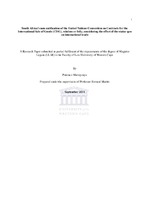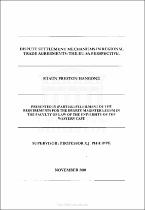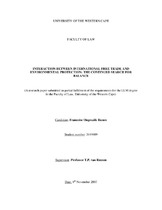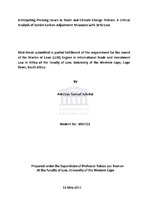| dc.contributor.advisor | Martin, Bernard | |
| dc.contributor.author | Matinyenya, Patience | |
| dc.contributor.other | NULL | |
| dc.date.accessioned | 2014-03-07T07:45:52Z | |
| dc.date.available | 2013/04/11 | |
| dc.date.available | 2013/04/11 11:06 | |
| dc.date.available | 2014-03-07T07:45:52Z | |
| dc.date.issued | 2011 | |
| dc.identifier.uri | http://hdl.handle.net/11394/2926 | |
| dc.description | Magister Legum - LLM | en_US |
| dc.description.abstract | The United Nations Convention on Contracts for the International Sale of Goods 1980 (CISG) seeks to provide a standard uniform law for international sales contracts. This research paper analyses the rationale behind South Africa’s delay in deciding whether to ratify the CISG, and its possible effect on trade with other nations. The CISG drafters hoped that uniformity would remove barriers to international sales thereby facilitating international trade. Ratification of the convention is only the beginning of uniformity; uniformity must then be extended to its application and interpretation. Not all countries have ratified the Convention yet they engage in international trade in goods: this state of affairs presents challenges since traders have to choose a national law that applies to their contract where CISG does not apply. This takes traders back to the undesirable pre-CISG era. On the other hand, those States that have ratified the convention face different challenges, the biggest one being a lack of uniformity in its interpretation. The problem of differing interpretations arises because some CISG Articles are vague leading to varied interpretations by national courts. Further, the CISG is still largely misunderstood and some traders from States that have ratified CISG exclude it from application. South Africa can only ratify an international instrument such as the CISG, after it has been tabled before Parliament, and debated upon in accordance with the Constitution. CISG’s shortcomings, particularly regarding interpretation, make it far from certain that CISG would pass the rigorous legislative process. Nonetheless, the Constitution of South Africa requires the South African courts and legislature to promote principles of international law. The paper, therefore, examines, whether the Legislature has a constitutional obligation to ratify CISG. South Africa’s membership of the WTO requires that it promote international trade by removing trade barriers. It is, therefore, vital for South Africa to be seen to be actively facilitating international trade. Even though the trade benefits which flow from ratification are not always visible in States that have ratified the CISG, there is some doubt whether South Africa can sustain its trade relations without ratifying the CISG. The paper shows that the formation of contracts under the South African common law is very similar to formation as set out under Part II of the CISG and if the CISG were to be adopted in South Africa, no major changes would be needed in this regard. International commercial principles as an alternative to the CISG still require a domestic law to govern the contract and would, therefore, leave South African traders in the same position they are in currently, where their trading relations are often governed by foreign laws. Ratifying CISG would certainly simplify contract negotiations particularly with regard to governing law provisions. Overall the advantages of ratification for South Africa far outweigh the shortcomings of the CISG, and ratification will assist in ensuring that South African traders get an opportunity to enter the international trade arena on an equal platform with traders from other nations. | en_US |
| dc.language.iso | en | en_US |
| dc.publisher | University of the Western Cape | en_US |
| dc.subject | United Nations Convention on Contracts for the International Sale of Goods (CISG) | en_US |
| dc.subject | Non-ratification | en_US |
| dc.subject | United Nations Commission on International Trade Law (UNICITRAL) | en_US |
| dc.subject | International sales contracts | en_US |
| dc.subject | International trade | en_US |
| dc.subject | Trade policy | en_US |
| dc.subject | World Trade Organisation obligations | en_US |
| dc.subject | Constitutional obligations | en_US |
| dc.subject | Comparative lessons | en_US |
| dc.subject | Alternatives to CISG | en_US |
| dc.title | South frica’s non-ratification of the United Nations convention on Contracts for the International Sale of Goods (CISG), wisdom or folly, considering the effect of the status quo on international trade | en_US |
| dc.rights.holder | Copyright: University of the Western Cape | en_US |
| dc.description.country | South Africa | |




